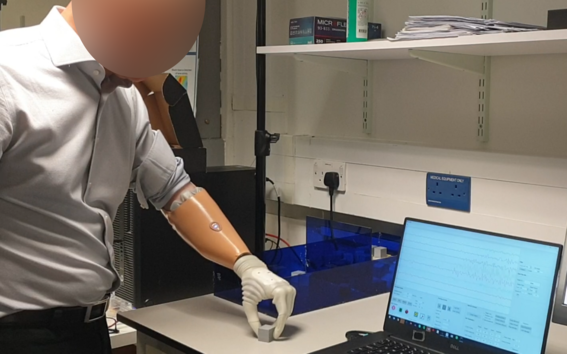A new type of hand prosthesis learns from the user — and the user learns from the prosthesis

Aalto University doctoral candidate Dennis Yeung and his research group have developed and tested a new type of technology that enables better compatibility between a prosthesis and the amputated area. The study was conducted in cooperation with HUS (Helsinki University Hospital) and Imperial College London. The study was funded by the Academy of Finland and the European Research Council.
People whose upper limb has been amputated can control the robotic prosthesis by contracting their remaining muscles. The connection where a prosthesis detects electrical signals produced by the muscle is known as a myoelectric interface. The most advanced prostheses use machine learning algorithms that help interpret these user-generated signals. However, such connections are often very sensitive to external factors, such as sweating, and become weaker over time. To solve this problem, the research community has proposed various algorithms that could better adapt to changing circumstances.
Currently existing systems require adjustments or other measures from the user, but Yeung and his team developed a fully automated system that learns during normal use and thus adapts to varying conditions.
’In this system, the user and the system learn from each other simultaneously. This has potential benefits in improving the convenience and robustness of robotic prostheses’, Yeung says.
More reliable prostheses
The research results were tested in a virtual environment where they were compared to currently existing systems. After these successful tests, the research team tested the user interface with a state-of-the-art prosthesis at Imperial College London by having an amputee conduct Clothespin Relocation Tests which are widely used by physiotherapists to assess the function of the upper limbs.
Adaptive prosthetic devices are rather expensive. Improving the reliability of the systems reduces the financial risks for individuals and public health institutions when obtaining prostheses.
The functionality of the system has been studied with controlled and standardised tests, but the needs of the users can best be determined with qualitative longitudinal studies.
’For future development, it is very important to continue cooperation with health care centres and prosthesis users’, Yeung says.
The results have been published in IEEE Transactions on Biomedical Engineering. The Open Access article is available through this link.
Further information:
Dennis Yeung
Doctoral candidate
Aalto University
dennis.yeung@aalto.fi
+358 50 3230 897
Read more news

Aalto University is introducing ORCID’s Researcher Connect service
Aalto University is introducing ORCID's Researcher Connect service, which facilitates information transfer between researchers' ORCID profiles and the university's research information management system, ACRIS.
Nature of Process: Exhibition by the students of the ‘Personal Exploration’ Course
Nature of Process is a multi-material exhibition of 14 Master´s students of Aalto ARTSEden Telila's master's thesis contributed to Ramboll's geotechnical toolkit
Geoengineering alum Eden Telila helped Ramboll automate manual tasks.






